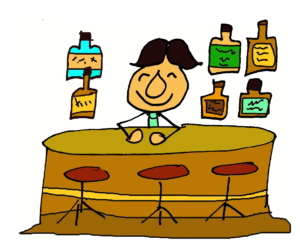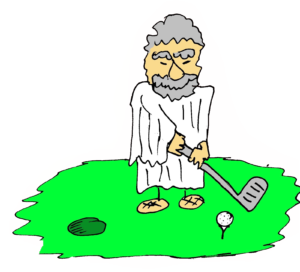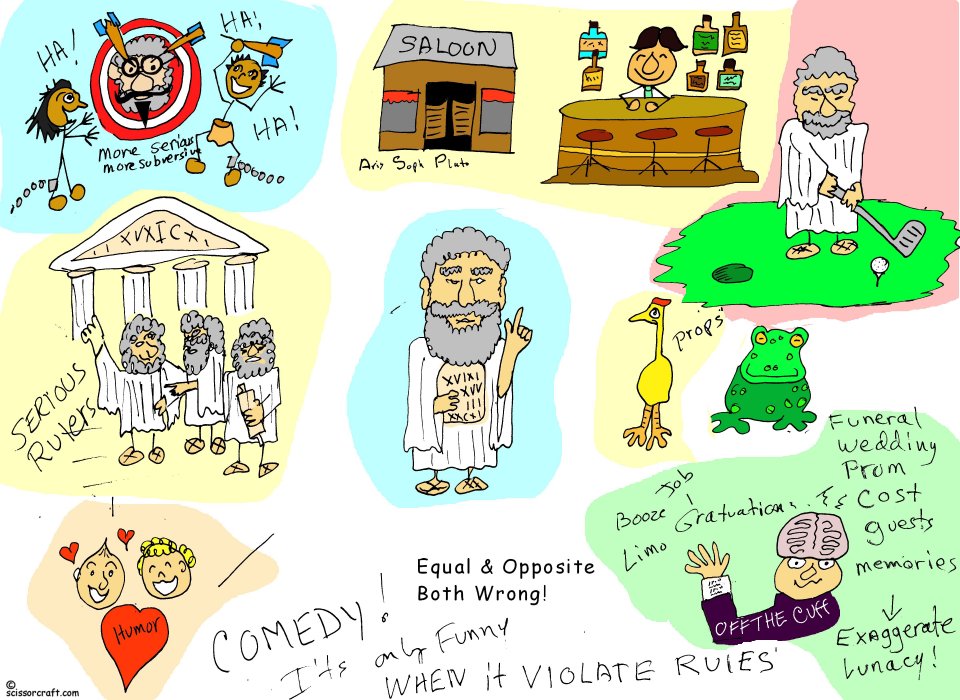 Philosophy of Funny, aka Humor Gets a Bad Rap
Philosophy of Funny, aka Humor Gets a Bad Rap
When people are asked what’s important in their lives, they often mention humor. Sense of humor nears the top of the most wanted traits couples want most in a partner.
Since ancient times, over 3,000 years, philosophers have claimed dominion over all that is important in life, but the most that appears in writing by any philosopher of note is a few paragraphs and one essay. The first serious attempt to put a philosophical finger on humor was the book “Laughter,” (1900) by philosopher Henri Bergson.
How sad for them! But then again, how sad for us!
We’ve been guided into civilization by a gang of grumpy gusses!
The Set Up
Recipe Ingredients:
- A pinch of fiction:
- A sprinkle of history:
- A dash of irony:
Philosophers of Antiquity – Fact
Socrates said “we should never lead a life not subjected to examination!”
Which is ironic since most ancient philosophers looked down their noses at laughter and mirth.
Plato believed that in the ideal state, comedy should be tightly controlled.
“We shall enjoin that such representations be left to slaves or hired aliens, and that they receive no serious consideration whatsoever.”
Freed slave and Greek Stoic philosopher Epictetus advises
“Let not your laughter be loud, frequent, or unrestrained.”
According to rumor Epictetus never smiled or laughed.
Aristotle threw us a bone, however when he said, “The secret to humor is surprise.”
The above is an example of a set up for a joke.
Here’s the Delivery
Socrates, Plato and Aristotle walked into a bar.
Socrates asked the bartender, “Will you tell us of your meager life as a servant?
Bartender answers “It is hard work, but I can laugh out loud, with gusto and never worry about consideration.”
Plato said, “Thank you for your service.”
Aristotle expressed surprised.
Ba dum, dum.
Joke Ingredients – Recipe Break-Down:
- A pinch fiction: Three guys walk into a bar…
- A sprinkle of history: Socrates, Plato, Epictetus, and Aristotle…
- A dash of irony:
Socrates asks question of the bartender who responds in Epictetus’ own words
which reinforce Plato’s division of classes and
surprises Aristotle with his candor.
Benign Violations
Philosopher Peter McGraw developed the theory of ‘benign violation.’
Humor violates our perceptions as to how things work – but is funny because it happens in a non-threatening way.
When you hear a good joke in the split second or two it takes to figure it out, finally get it, you become delighted with yourself that you got the joke…also known as psychological satisfaction.
Diagnosis:
“humor is a psychological response characterized by the positive emotion of amusement, the appraisal that something is funny, and the tendency to laugh.”
(Hysterical…)
Which also explains why nobody wants to play golf with a philosopher.
 Analyzing Humor
Analyzing Humor
American writer E. B. White said, “Analyzing humor is like dissecting a frog. Few people are interested and the frog dies of it.“
Jokes created by formula seem unsatisfying and lacking in that funny-bone hit that defines all that is funny.
That is not to say there are no guidelines to writing a good joke.
How to Create a Good Joke
Speak off the cuff. Phrase originally referred to speakers who made notes on his shirt cuffs. Off the cuff means the speaker prepared to some extent.
- Don’t rely on inspiration – Be prepared
- Brainstorm: Make a list of words associated with the speaking event
- Exaggerate descriptions to the point of ludicrousness, unbelievability
- Be funny. Leave the preaching to the rabbi, priest or minister
- Use the joke or gag style that fits the situation and and fits you
- Practice every day. Tell anyone who will listen, including the dog
- Personalize. Name the characters and places. Make your joke live
- Brevity works best
- Laugh at yourself-use yourself or your family as the butt
- Use the brainstorm list to find joke topics to apply to your target
- Switch, reword the joke if necessary to give it a custom fit
- Memorize some ‘saver’ jokes to save your life if you’re dying on stage
What jokes and philosophy have in common
- They can surprise you to amusement
- And provoke you to examine life
Always remember:
The First Law of Philosophy:
For every philosopher, there exists an equal and opposite philosopher.
The Second Law of Philosophy:
They’re both wrong.
The Art of Humor is:
- Kryptonite to the Restrained
- Anathema to the Logician
- Odiferous to the Sage
The absence of philosophical discourse on laughter and mirth throughout the history of philosophy reveals something more powerful than bread, wine and thou.
Self Preservation
– that part of ‘life not subject to examination’ – Fear of pain or damage to Id and Ego:
- “We shall enjoin that such representations be left to slaves or hired aliens, and that they receive no serious consideration whatsoever.”
- Let not your laughter be loud, frequent, or unrestrained.”
- in the ideal state, comedy should be tightly controlled.

BOO!
What scary things this laughter and mirth.![]()
My question to philosophers is what is it you are pretending not to know?
Mind Map for Speech
Our mind-maps start in the center then travel in a spiral starting with lower left and continuing in a spiral till lower right – ish. We can’t explain why 🙂

Research mysterious and illusive Filosopher’s Funniest Failings.
- https://www.npr.org/templates/story/story.php?storyId=10158510 http://www.thinctanc.co.uk/words/comedy.html https://www.ncbi.nlm.nih.gov/pmc/articles/PMC2269245/ https://en.wikipedia.org/wiki/Humour
- https://www.psytoolkit.org/survey-library/humor-hsq.html
- https://en.wikipedia.org/wiki/Comedy
- http://socialpsychonline.com/2016/04/psychology-of-humor-funny-comedy/ Philosophy of Humor”, The Stanford Encyclopedia of Philosophy >
- The encyclopedia of humor, by Joey Adams MCMLXVIII (1968)
- ruin all humor with philosophy, visit https://www.iep.utm.edu/humor/ http://pvspade.com/Sartre/cookbook.html https://punsandoneliners.com/randomness/alphabetical-list-of-joke-topics/
- http://www.dead-philosophers.com/
Speech by Pat Kelley 3/8/2019

